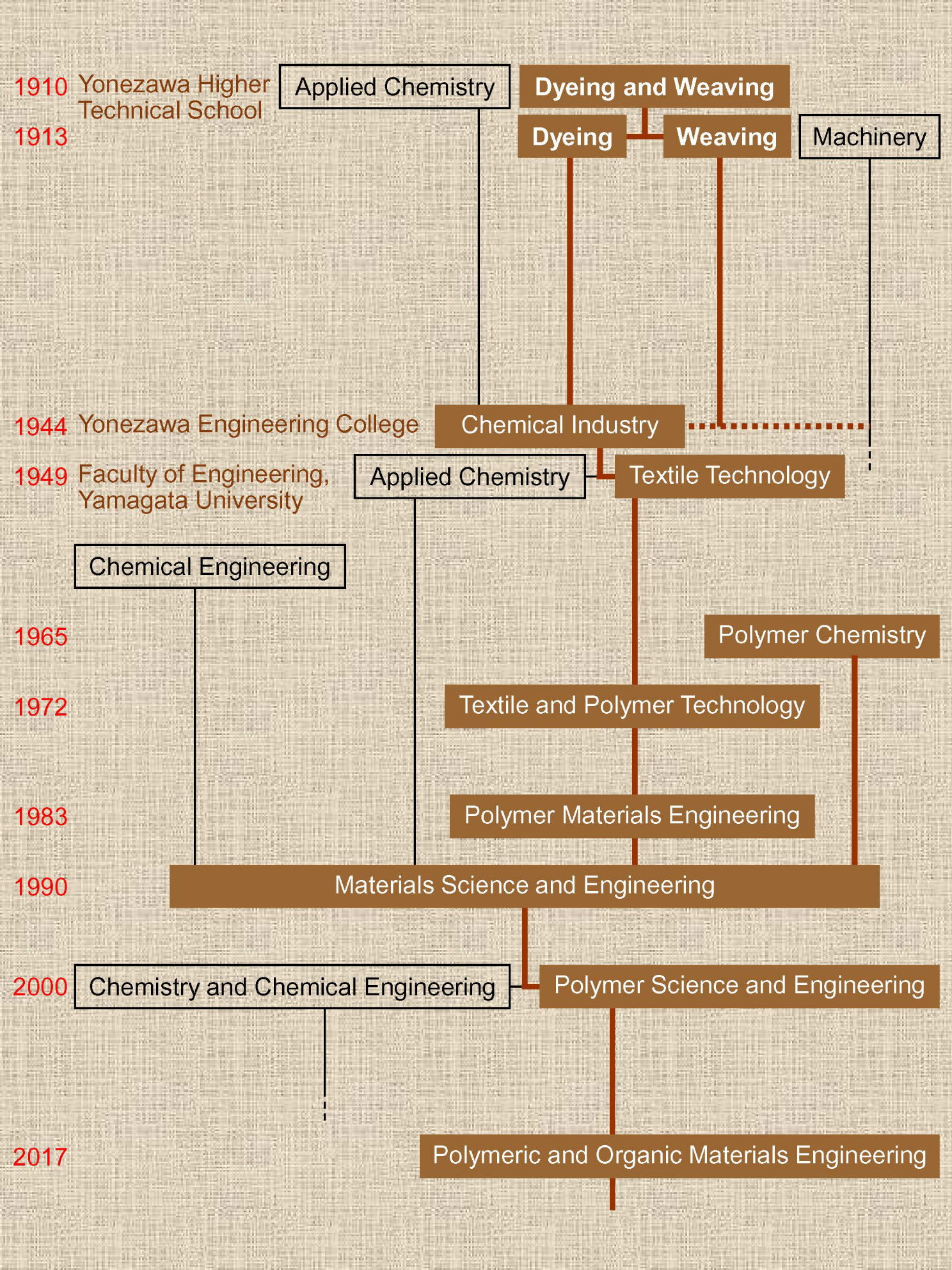About DPOME


Home > About DPOME
Invigorate Japan through technological innovation in polymeric and organic materials
– Train specialists in polymeric and organic materials who are indispensable for the technological development of epoch-making advanced industries –
Polymeric and organic materials are one of the three major classes of materials, the other two being metals and ceramics. The history of polymeric and organic materials can be traced from the prehistoric use of natural polymers from plant and animal sources all the way to the synthesis of varied pigments against a backdrop of rapid progress in organic chemistry in the 19th century. In the 20th century, technologies for the synthesis of fibers and polymers became established and mass production of synthetic polymers and plastics began along with the development of petrochemistry.

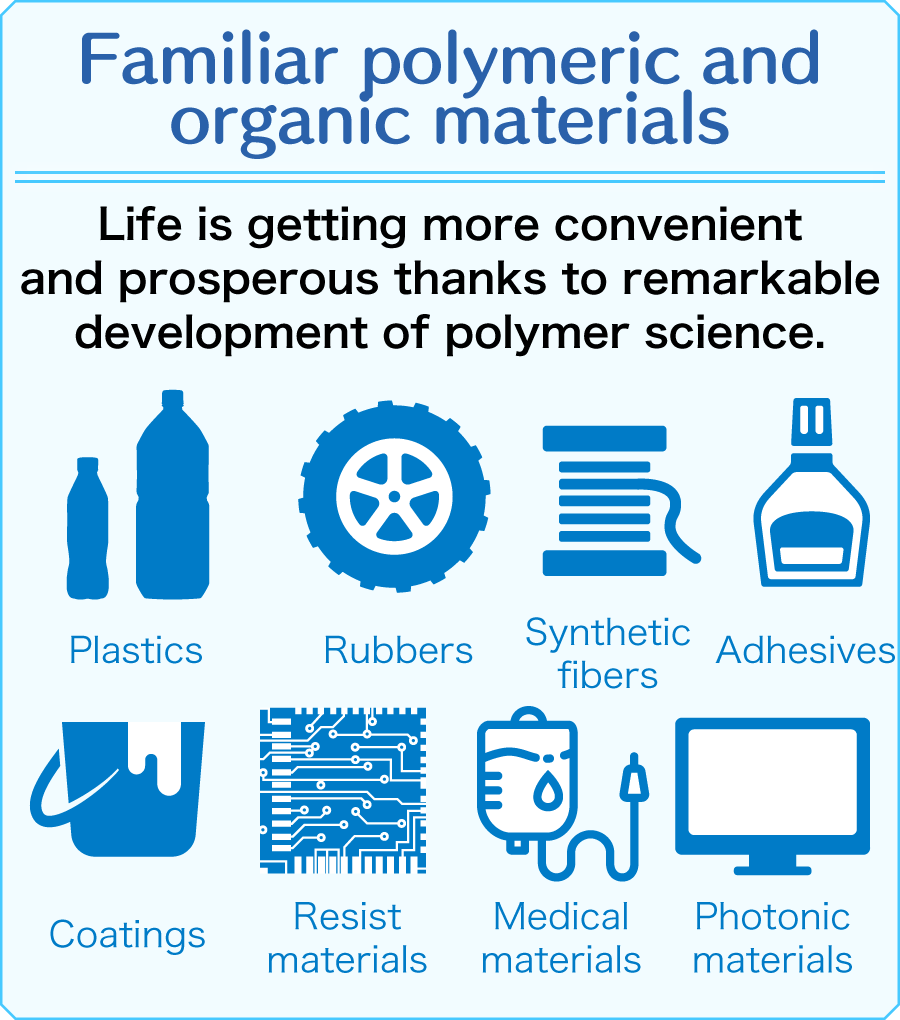
In the late 20th century, the photonic and electronic functions of organic materials have attracted attention, as evidenced by the Nobel Prize in Chemistry 2000 “for the discovery and development of conductive polymers”. In addition, innovation in the technology for the molecular synthesis of organic materials is advancing rapidly. Such materials innovation has given birth to process innovation. For example, polymer processing techniques that utilize printing technologies have been created. Shifting our attention to industry, the integration of organic device hardware, such as smartphones and tablets (devices in which the incorporated organic materials are essential for the exhibited functionality), with software and telecommunication systems is leading to the creation of novel industries.
Under these circumstances, Department of Polymer Science and Engineering was established in 2000. The department has achieved significant progress in the education and research of polymeric and organic materials, especially in the areas of synthesis, physical properties and organic devices.
Internationally top-class research in diverse areas, from electronic materials, to food and biopolymers.
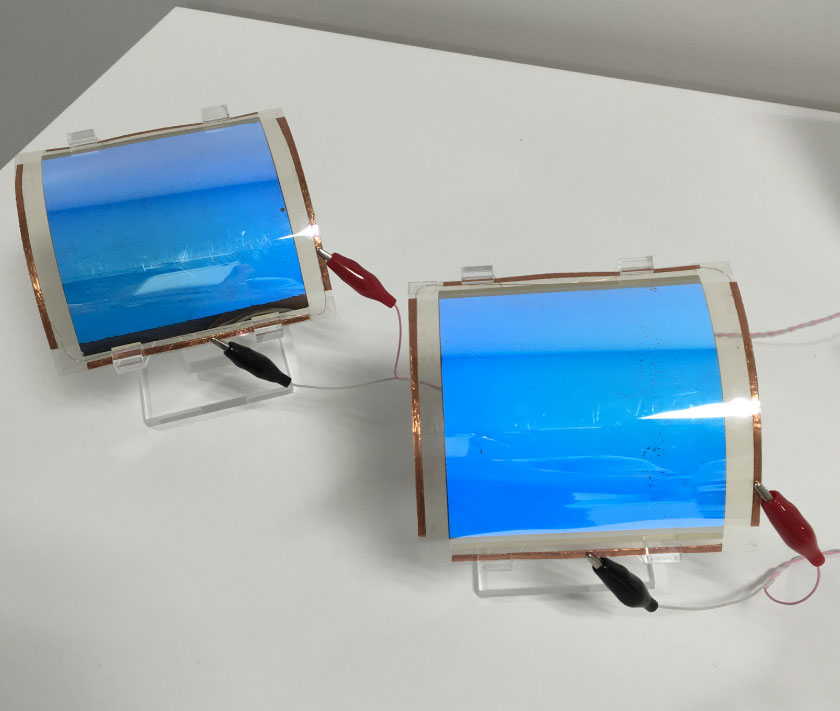
From the dawn of organic light-emitting diodes (OLEDs) to present-day commercialization, their research, based on materials chemistry, has been recognized as internationally top-class. With their efforts in the recently rapidly developing area of organic thin film solar cells, they have embarked on a novel challenge that encompasses all of “organic electronics”.
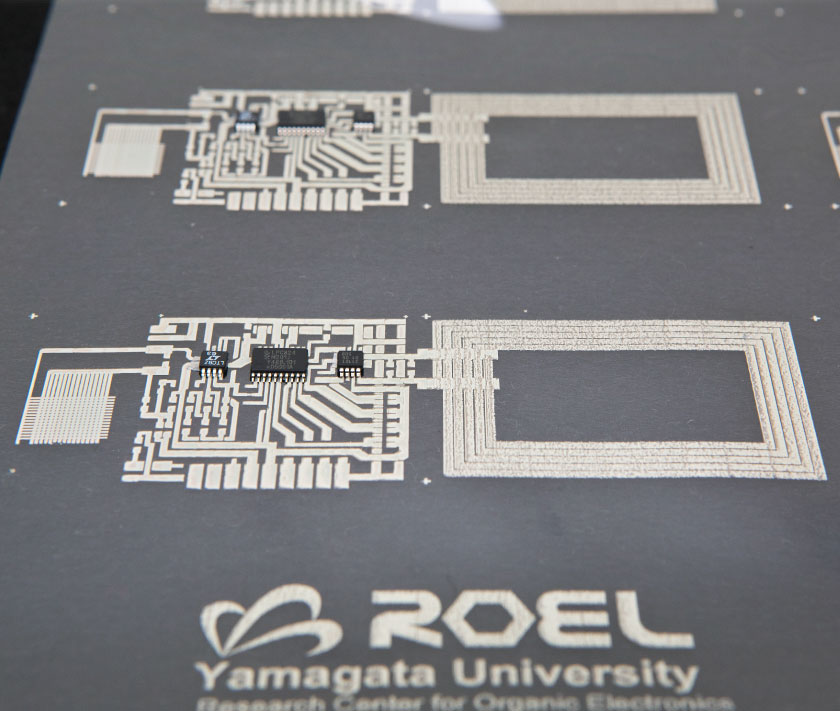
Research on flexible electronics, i.e., thin, light and flexible electronic devices based on organic transistors that use organic semiconductors, is in progress. Representative examples include flexible displays, flexible memory and flexible biosensors and these researches have attracted the attention of several companies.
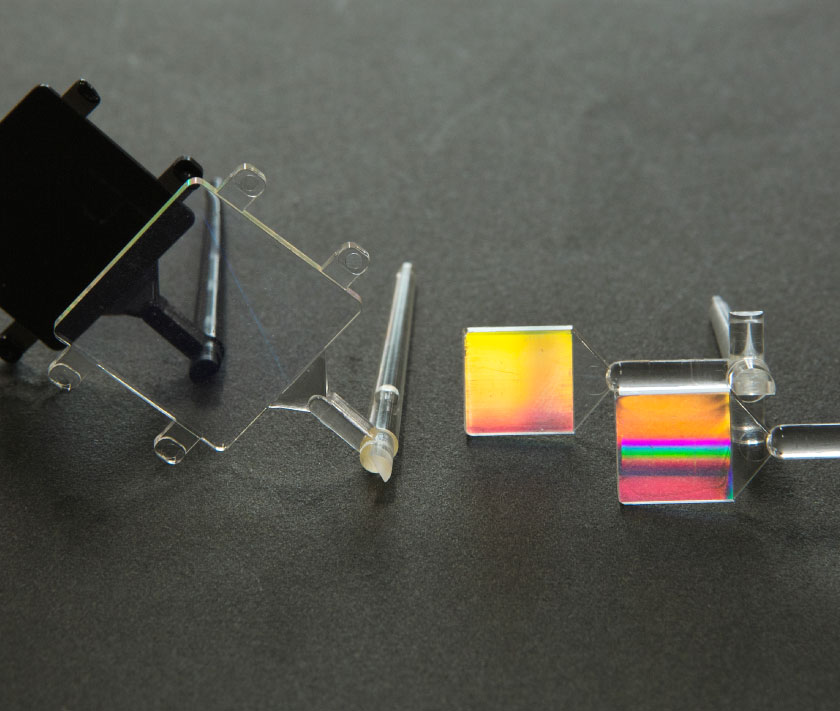
Research on ultra-thin-walled molding, micro- and nano-surface structure patterning, ultra-fine molding, ultra-precision molding and functional composite material processing by focusing on plastics processing at the micro- and nano-scales. In addition, development of high value-added and high-functionality components such as microscale or nanoscale plastic machine parts and optical elements is in progress.
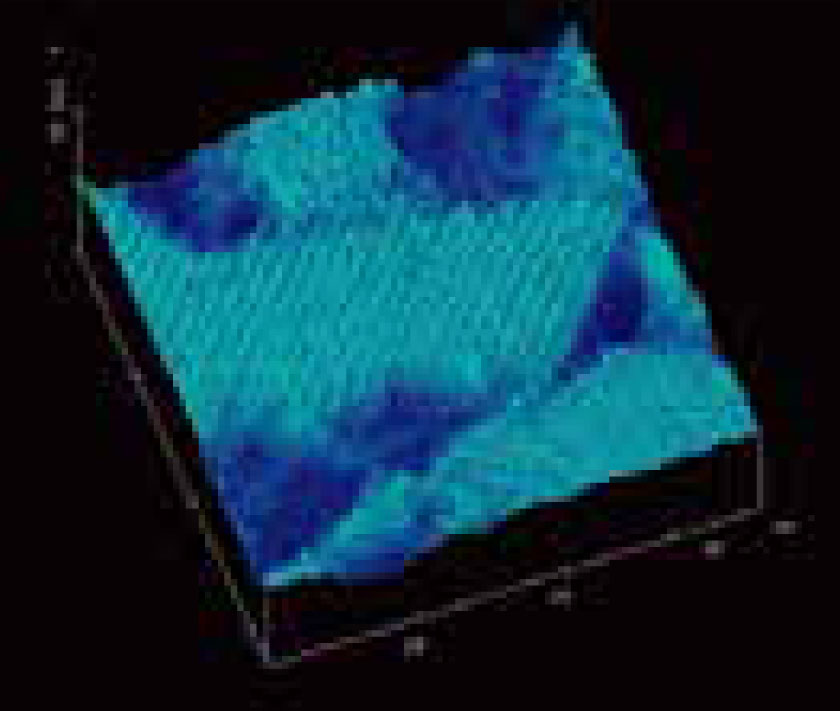
By examining two dimensional films (Langmuir-Blodgett films etc.) using atomic force microscopes, they succeeded in the first direct molecular level observation of a polymer chain. In this process, the various structures formed by the chain and their characteristics were clarified. The ability to actually investigate polymers at the molecular scale is exceedingly rare, limited to just a few laboratories in the whole world.

Research in rheology (study of the flow of materials in the liquid state) and plastics processing, especially important in the manufacturing of plastic products, is being conducted. Incredibly, by applying plastic processing technology to food processing, bread from 100% rice flour, hitherto considered impossible, was successfully produced. With extensive industrial collaboration, the research group enjoys a very high public profile.
Technologies that capitalize on the diverse capabilities of polymeric and organic materials provide the indispensable infrastructure for a wide range of industrial sectors: electronics and information; health care, social welfare and consumer goods; automobile, aviation and space etc. The circumstances that led to the development of several polymeric and organic materials technologies can be traced to the societal challenges that they were meant to address. A current challenge is the development of technologies with progressively greater capabilities that can respond intelligently to the circumstances. Organic electronics and organic devices, which include areas such as organic light-emitting diodes (OLEDs), organic transistors and organic solar cells, have already achieved remarkable progress by utilizing the unique characteristics of polymeric and organic materials. The pace of innovation in processes, such as those that utilize various printing technologies, and in products, such as flexible electronic devices, are expected to further increase provided that the singular properties of polymeric and organic materials are intelligently exploited further. Under such circumstances, practical engineers, with holistic values and a broad outlook, who can utilize their deep engineering expertise and technical ability to enrich society by the creation of new technologies and novel industries are the need of the hour.
In this department, in addition to extensive general education and the fundamentals of engineering, we educate future engineers in polymeric and organic materials to adopt a comprehensive view spanning various scales, from the molecular to the macroscopic. Our engineers are also trained to use their technical expertise to logically and rationally analyze the current industrial scenario at the local, national and global levels. Finally, we aim to cultivate self-motivated engineers who launch their own novel initiatives based on their analysis and understanding of the industrial scenario.
With a faculty of approximately 30 scientists, our department is attracting constant attention as a major center for polymeric and organic materials. Our top-notch faculty is actively engaged in education and research in their respective fields. We aim to cultivate original polymeric and organic materials engineers by educating them from fundamentals to applications in small groups and offering them extensive guidance throughout their education. We also actively facilitate further education of engineers already employed in industrial developments.
It is no exaggeration to say that the fundamental characteristics of polymeric/ and organic materials are determined by the basic structure of each molecule (molecular structure, primary structure, nanostructure) and the higher-order structure relating to molecular assembly (intermediate structure, secondary/tertiary structure, mesostructure). In addition, to create products equipped with the functions demanded by society and industry, advanced processing techologies, and novel material combinations and systems (macro-engineering) are also very important.
The department focuses on the development of engineers and specialists whose creativity and practicality are grounded on deep scientific scholarship. This is accomplished through tight integration of teaching and research, all the way from the molecular level fundamentals of polymeric and organic materials to practical applications and products. The department aims to train students to have wide interests, to be able to logically and rationally analyze and understand the current industrial situation both locally and nationally, to be sufficiently self-motivated to launch novel initiatives based on this understanding and who possess a global perspective.
In the first year, students of this department are educated in the foundations such as mathematics and physics, and the fundamentals of their academic discipline. In the second year, in addition to mathematics and physics, subjects closely related to students’ academic discipline such as organic chemistry and physical chemistry; introductions to synthestic chemistry, photonic and electronic materials and physical engineering; structure analysis; courses from other departments; English and experimental courses allow students to acquire the technical knowledge expected from every student of the department. From the third year, students specialize in one of three areas: synthetic chemistry, photonic and electronic materials and physical engineering, and delve deeper into their area of specialization but now in small groups. In addition, from the second semester of the third year, the students are affiliated with research groups and continue their education through seminars and experiments in small groups, and through project-based learning by performing supervised research. Through these means, the department aims to train engineers who are experts in practical applications of their knowledge.
Thanks to a comprehensive curriculum in polymeric and organic materials, students can learn from fundamentals to applications in a coherent way. Depending on their interests, students can specialize in either chemistry or physics, and gain knowledge and experience necessary to flourish in the future. By engaging in cutting-edge research, students can learn practical techniques and deepen their expertise in polymeric and organic materials. Through education in small groups and group work, and through specialized research with any of the 30 or so faculty, students can become original polymeric and organic materials engineers highly valued by society.
